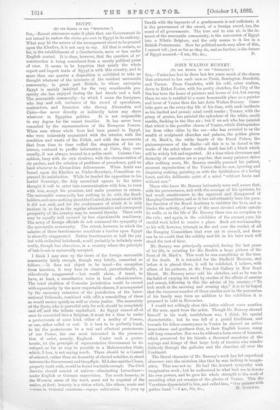JOHN WALTON BUNNEY.
[TO THE MATO& OP THE "SPECTATOR."]
SIN—Venice has lost in these last few years much of the charm• that attracted to her such men as Pr•out, Bonington, Stanfield, and Turner. From Canaletto, with his cold, sober realism,. down to Birket Foster, with his pretty sketches, the City of the Sea has been the home of painters and lovers of Art, but among- these no one is entitled to a more honourable place as a painter. and lover of Venice than the late John Walton Bunney. Cana- letto gave us the every-day life of his time, with such incidents as his limited and prosaic mind could render ; Turner, with the• grasp of genius, has painted the splendour of the white, sunlit marble, flashing in the blue air ; but if we ask who has painted that which is the peculiar charm of Venice, which distinguishes hex from other cities by the sea—who has revealed to us the wealth of sculptured churches and palaces, the golden gloom of St. Mark's, the white façade of the Ducal Palace, the picturesqueness of the Rialto—all this is to be found in the works of the artist whose sudden death has left a blank which will be widely felt and regretted. .At a time when cleverness and dexterity of execution are so popular, that many painters strive- after nothing more, Mr. Bunney steadily pursued his patient,. reverent reproduction of the Venice that he saw, ignoring and despising nothing, painting on with the faithfulness of a loving. heart, and the deliberate quiet of a mind " without haste and without rest."
Those who knew Mr. Bunney intimately were well aware that,. with his perseverance, and with the courage of his opinions, he• had much sensitiveness to the approval and disapproval of Hanging Committees, and as it has unfortunately been the pecu- liar function of the Royal Academy to embitter the lives, and so hinder the activity, of many of the most devoted artists outside its walls, so in the life of Mr. Bunney there was no exception to the rule ; and again, in the exhibition of the present year, his careful work failed to receive a place. Such art-workmanship as his will, however, triumph in the end over the verdict of all the Hanging Committees that ever sat in council, and there can be no i.oubt that the solidity and life in his later work will stand the test of time.
Mr•. Bunney was principally occupied, during the last years of his life, in painting for Mr. Ruskin a large picture of the front of St. Mark's. This work he was completing at the time of his death. It is intended for the Sheffield Museum, atid before it is placed • there, it will be exhibited, I believe, with others of his pictures, at the Fine-Art Gallery in Now Bond. Street. Mr. Bonney never sold his sketches, and as he was in the habit of varying his work by studies of the effects of sunrise and sunset, following in this the advice of his master,—" To. look much at the morning and evening sky," it is to be hoped that the immense number of these studies now iu the possession. of his family may form an addition to the exhibition it is proposed to hold in November.
I would not willingly close this letter. without some mention. of the man, apart from the artist. Though Mr. Bunney showed himself in his work, truthfulness was, I think, his special characteristic ; but he was full of a genial kindliness, and towards his fellow-countrymen in Venice he showed an active benevolence and goodness that, in their English homes, many will long remember•. Nor• was he without a keen sense of humour, which preserved for his friends a thousand anecdotes of the- sayings and doings of that large body of tourists who wander listlessly through the galleries and the churches all over the Continent.
The literal character of Mr. Bunney's work has led superficial observers into the mistaken idea that he was lacking in imagin- ation, This was not so. He had the .keenest sympathy with imaginative work ; but he understood. to what best use to devote. his own powers, and he gave his whole strength to the work of recording what yet remains of the glories of Venice. This the Venetians appreciated in him, and called him, " Our painter with
golden hand."—I am, Sir, &c., H. GOODWIN.


































 Previous page
Previous page